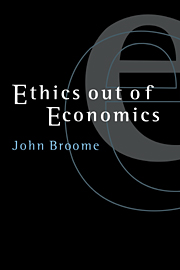4 - Discounting the future
Published online by Cambridge University Press: 12 November 2009
Summary
Introduction
Should future goods be discounted? Should benefits that will come in the distant future count for less in our planning than benefits that will come in the present or near future? I am not thinking of the plans made by an individual on her own behalf, but of plans made on behalf of the public as a whole, particularly by governments. Should future goods be discounted by public authorities in their planning?
In cost–benefit analysis and other applications of welfare economics, economists typically do count future goods for less than present goods. To many philosophers this seems a reprehensible practice. How, they ask, can the mere date at which a good occurs make any difference to its value? Discounting seems to these philosophers a device for unjustly promoting our own interests at the expense of our descendants'. On the face of it, then, typical economists and typical philosophers seem to disagree. But actually I think there is more misunderstanding here than disagreement. Some economists do indeed disagree fundamentally with some philosophers, but most economists and most philosophers would be on the same side if they came to understand each other properly. I hope this chapter may contribute to a mutual understanding. My first purpose in this chapter is to try and explain to philosophers what economists are doing when they discount the future, and why they are doing it.
The basic point is very simple. When economists and philosophers think of discounting, they typically think of discounting different things. Economists typically discount the sorts of goods that are bought and sold in markets, which I shall call commodities. Philosophers are typically thinking of a more fundamental good, people's wellbeing.
- Type
- Chapter
- Information
- Ethics out of Economics , pp. 44 - 67Publisher: Cambridge University PressPrint publication year: 1999



